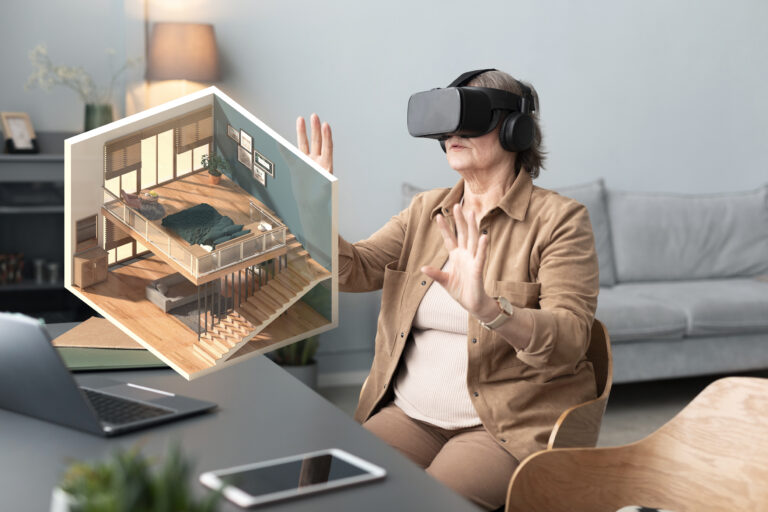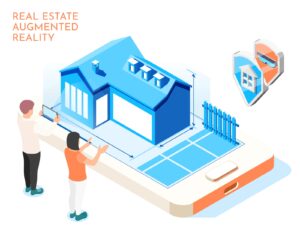
VR and AI in Real Estate
In recent years, the real estate sector has witnessed a transformative impact from emerging technologies, with two significant advancements standing out: virtual reality (VR) and artificial intelligence (AI). VR enables immersive experiences, allowing potential buyers to virtually tour properties and visualize spaces before even stepping foot inside. On the other hand, AI revolutionizes various aspects of the real estate industry, from property search and valuation to marketing and property management. In this article, we will explore how VR and AI are changing the real estate sector and revolutionizing traditional practices, enhancing property visualization, streamlining property search, automating valuation and analysis, transforming marketing and sales, improving property management, and unlocking the future potential of VR and AI in real estate.

1. Introduction to VR and AI in Real Estate
Virtual reality technology allows users to experience a computer-generated environment that simulates real-life spaces or situations. In the context of real estate, VR enables potential buyers or tenants to virtually explore properties without physically being present. By wearing a VR headset, users can immerse themselves in a 3D representation of a property, giving them a realistic sense of its space, layout, and atmosphere.
1.2 Exploring Artificial Intelligence (AI) in Real Estate
Artificial intelligence has made significant strides in the real estate industry, empowering businesses to analyze vast amounts of data, automate processes, and provide personalized experiences. AI algorithms can analyze market trends, predict property values, and offer tailored property recommendations based on user preferences. Additionally, AI-powered chatbots can engage with customers, answer inquiries, and assist with property-related tasks.
2. Enhancing Property Visualization through Virtual Reality

Virtual reality is transforming the way properties are visualized and showcased to potential buyers or renters. Here are some ways VR is enhancing property visualization:
With VR, buyers can take immersive 3D virtual tours of properties from the comfort of their own homes. They can navigate through rooms, explore different angles, and get a realistic feel for the space. This technology allows buyers to narrow down their options and make more informed decisions before physically visiting a property.
2.2 Virtual Staging and Interior Design
VR technology enables virtual staging, where vacant properties are virtually furnished and decorated. This allows potential buyers to visualize the potential of an empty space and see various interior design options. Virtual staging saves time and costs associated with traditional staging, making properties more appealing to potential buyers.
2.3 Virtual Reality Showrooms and Open Houses
Virtual reality showrooms and open houses provide an immersive experience for potential buyers. Developers can create virtual environments that showcase properties under construction, giving buyers a realistic preview of the final product. Virtual reality showrooms also allow for customization options, where buyers can visualize different finishes, materials, or layouts.
3. Streamlining Property Search and Tours with AI

Artificial intelligence is making property searches and tours more efficient and personalized. Here’s how AI is streamlining the process:
3.1 Intelligent Property Search Platforms
AI-powered property search platforms use algorithms to analyze user preferences and provide them with targeted property listings. These platforms can consider factors like location, price range, amenities, and personal preferences to deliver highly relevant results, saving buyers time and effort in finding their ideal property.
3.2 AI-Powered Virtual Property Tours
AI-powered virtual property tours go beyond static images or videos. They can use AI algorithms to create customized tours based on user preferences, highlighting specific features or areas of interest. These tours allow buyers to virtually walk through a property and focus on the aspects that matter most to them.
3.3 Personalized Property Recommendations
AI algorithms can analyze user behavior, preferences, and historical data to provide personalized property recommendations. These recommendations can consider factors like previous property searches, saved listings, and feedback, helping buyers discover properties that align with their specific needs and preferences.
4. Automating Property Valuation and Analysis with AI

Artificial intelligence is also transforming property valuation and analysis, making it faster and more accurate. Here’s how AI is automating these processes:
4.1 AI-Based Property Valuation Models
AI-powered property valuation models can analyze historical sales data, market trends, and property attributes to estimate property values more accurately. These models can consider a wide range of factors and provide real-time valuations, helping sellers and buyers make informed decisions based on market conditions.
4.2 Automated Comparative Market Analysis
Comparative market analysis (CMA) involves assessing the value of a property by comparing it to similar properties in the area. AI algorithms can automate this process by analyzing vast amounts of data, such as property sales records and market trends. This automation saves time and provides more comprehensive and accurate insights for real estate professionals.
4.3 Predictive Analytics for Real Estate Investment
AI-powered predictive analytics models can help real estate investors make data-driven decisions. These models can analyze historical data, market trends, and other relevant factors to predict future property values and investment opportunities. By leveraging AI, investors can mitigate risks and identify profitable investment prospects more effectively.
5. Implications and Future Potential of VR and AI in Real Estate

5.1 The Impact on Real Estate Professionals
While VR and AI bring many benefits to the real estate sector, they also raise concerns about the role of real estate professionals. Will AI replace agents and property managers? Not entirely. These technologies enhance their capabilities and streamline processes, allowing professionals to focus on building relationships and providing personalized services. So, don’t worry, real estate agents; your job is safe for now.
5.2 Ethical Considerations and Privacy Concerns
As with any advanced technology, there are ethical considerations and privacy concerns to address. VR and AI collect vast amounts of data, ranging from user behavior to personal preferences. It’s crucial to prioritize privacy and ensure transparent data handling practices. Additionally, ethical considerations arise when using AI algorithms to make decisions that could impact individuals’ access to housing or property valuations. We need to find a balance between innovation and ethical responsibility.
5.3 The Future of VR and AI in Real Estate
The future of VR and AI in real estate is exciting and full of possibilities. As technology continues to evolve, we can expect more realistic virtual experiences, advanced AI algorithms, and even integration with other emerging technologies like augmented reality. The real estate sector will become more efficient, transparent, and accessible, offering a better experience for buyers, sellers, landlords, and tenants alike. So buckle up, because the future of real estate is virtual, intelligent, and anything but boring.
As technology continues to advance, the integration of VR and AI in the real estate sector shows great promise for the future. From revolutionizing property search and visualization to automating valuation and enhancing marketing efforts, these technologies are reshaping the way properties are bought, sold, and managed. However, as with any technological advancement, ethical considerations and privacy concerns must also be addressed. As we navigate this exciting frontier, it is crucial for real estate professionals and industry stakeholders to stay informed, adapt to new tools and practices, and embrace the potential of VR and AI to create a more efficient, transparent, and immersive real estate experience for all.